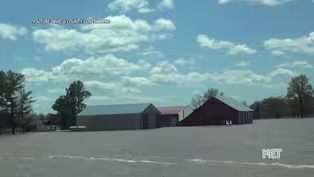
Cradle Club
Clip: Season 3 Episode 231 | 3m 19sVideo has Closed Captions
The Cradle School in Danville teaches parents the importance of a child's early years.
The Cradle School in Danville doesn't just teach children. It teaches parents the importance of a child's early years from birth to age three. It's because what happens then can make all the difference for a lifetime.
Problems playing video? | Closed Captioning Feedback
Problems playing video? | Closed Captioning Feedback
Kentucky Edition is a local public television program presented by KET

Cradle Club
Clip: Season 3 Episode 231 | 3m 19sVideo has Closed Captions
The Cradle School in Danville doesn't just teach children. It teaches parents the importance of a child's early years from birth to age three. It's because what happens then can make all the difference for a lifetime.
Problems playing video? | Closed Captioning Feedback
How to Watch Kentucky Edition
Kentucky Edition is available to stream on pbs.org and the free PBS App, available on iPhone, Apple TV, Android TV, Android smartphones, Amazon Fire TV, Amazon Fire Tablet, Roku, Samsung Smart TV, and Vizio.
Providing Support for PBS.org
Learn Moreabout PBS online sponsorshipThe Cradle School in Danville doesn't just teach children.
It teaches parents the importance of a child's early years from birth to age three.
It's because what happens then can make all the difference throughout a lifetime.
I absolutely love working with this age.
We work from birth, so four and I love that the kids are moldable and they're still ready to learn and they're excited.
And we found that the parents are so willing to have someone that will come alongside them and help them through that journey.
Our primary goal is to increase kindergarten readiness.
Around 70 to 80% of the students locally who are coming into kindergarten are not considered kindergarten ready.
So that's why it really got started.
We do a lot of learning activities, like once a month they'll get with you and they do.
They kind of see where your child is, where they're supposed to be all the way from birth.
Oh, come back from 5 to 5 years.
There wasn't getting his numbers at first, and we've only been going over a few months and he's already gotten eight and he's only three.
So we consist of two different parts.
We do individualized visits where we assign each student a parent educator.
And that parent educator plans individualized visits based on where they're at and their development in areas that they might need extra work like, say, cognitive skills by motor skills, letters, numbers, counting, etc.. And then we also have a group element.
So our group sessions are about an hour hour and a half long.
We start with a circle time, and in that circle time we focus on either numbers, letters, colors.
We also are kind of helping those children learn how to sit in a circle time and how to interact with other kids and how that works.
They begin a reading.
We'll sit down.
We'll read a book.
The kids get to interact or not interact as much.
We try to get the whole group together, get each kid to say their name, or at least we'll say their name and then read a book and have them react with the book.
We go from the circle time, then to the groups where we do, different skills.
There might be a cutting station or fine motor, Plato station.
That's just where the parent and the child can walk around together and they can partner in some of those tasks that maybe they wouldn't do at home.
He loves to come and do, and I think it's great for them to learn at a young age how to share, especially some of these kids are, you know, they're only kids or they got other siblings and they're way far apart.
So for them, they get to learn how to interact with kids their age or see how other kids play.
Having this room has been a blessing because it has allowed us to set it up to look like an actual kindergarten room.
And so when the parents and the children come in, they are learning how what does a circle time look like?
Where can you sit for that?
You may have toys in the room, but you can't play with them yet.
You have to.
Do, you know, maybe your stations first.
And so it gives the child an environment where they're growing and learning before they even see the classroom, because that can sometimes be intimidating to the kids, that when you go into kindergarten, you've never seen a classroom before.
So this gets this that learning curve for the kids and the families.
The program received a United Way grant to hire two additional staff members who help lead group activities and will ultimately work with their own families.
Family Grateful For Neighbors Helping During Flooding
Video has Closed Captions
Clip: S3 Ep231 | 1m 34s | The Green River flooded the Birk City area of Daviess County. (1m 34s)
KY Auditor Investigating State's Medical Cannabis Program
Video has Closed Captions
Clip: S3 Ep231 | 2m 19s | Complaints about the lottery process used to award business licenses. (2m 19s)
Providing Support for PBS.org
Learn Moreabout PBS online sponsorship
- News and Public Affairs

Top journalists deliver compelling original analysis of the hour's headlines.

- News and Public Affairs

FRONTLINE is investigative journalism that questions, explains and changes our world.












Support for PBS provided by:
Kentucky Edition is a local public television program presented by KET

